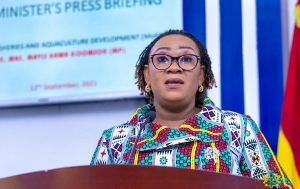In a fast-evolving international business climate, the demands on the maritime industry abounds. The expectations of maritime service providers in the maritime industry are not only economic but also social, environmental, and political.
A commitment to continuous learning and unlearning increases the likelihood of meeting these demands. This is why maritime sector companies are encouraged to prioritize staff training to keep abreast with modern trends and developments in this dynamic industry.
This is the gospel according to seasoned academic and chartered shipbroker, Mrs. Gertrude Ohene-Asienim (FICS) who is the Chief Executive Officer for the West Africa School of Shipping and Whitestone Shipbrokers Ltd.
She was speaking to Kennedy Mornah on the award-winning Eye on Port program, live on Accra-based Metro TV.
“That is why we are preaching that it is not enough to start a business. It is not enough to employ and it is not enough to have a university degree or any other qualification and stay where you are. Otherwise, at a point you become irrelevant,” Mrs. Ohene-Asienim beseeched.
She said when Ghanaian maritime sector companies and institutions equip their human resource with new knowledge and modern ways of doing things, the direct impact is telling. Not only does this improve productivity at the workplace, but such a working environment attracts international clients to do business with local companies.
She said as a matter of necessity, budgetary allocation for continuous professional development (CPD) of workers, must be prioritized each year.
“Organizations need to assess staff. You place someone in an operations room, what are the tools the person will need to be able to work efficiently in that role? Then, you have to develop the CPD that works to enhance his or her capabilities in that role,” she said.
Mrs. Ohene-Asienim revealed that like other reputable maritime training institutes that have sprung up in recent years, the West Africa School of Shipping (WASS) offers a wide array of maritime training programs. She said WASS was originally set up to provide continuous professional development programs for individuals and corporations in the maritime industry.
This includes tutoring for the foundational diploma, advanced diploma, and professional qualifying examinations of the Institute of Chartered Shipbrokers, London, and bespoke courses that cover the various sectors of the maritime industry.
“If you are a freight forwarder and you want to add ship agency to it, you can consider taking our port agency job. If you are into logistics, and you want to add ship management, we have a course for that. If you are a lawyer, and you want to know about maritime law, you can take our legal principles in shipping course,” she stated, among other things.
She said continuous professional development is not limited to industry-specific technical training but personal soft skills should be acquired too for holistic development.
The Fellow of ICS, London said, the world is currently leaning towards artificial intelligence, digital marketing, cloud-based systems, remote operations, occupational health, safety, and environment consciousness, among others, and organizations are being assessed along these lines. Thus, organizers must develop employees in this direction.
This interview came in the aftermath of an end-to-end shipping, logistics coordination, and management training programme at the West Africa School of Shipping in Tema.
The participants of this program were pulled from various sub-sectors and companies in the maritime industry and got the opportunity to discuss practical issues in shipping and logistics including risks and trade disruptions and how to strategize and mitigate them.
The participants told Eye on Port how much they relished the learning experience.
A Deputy Director of Logistics, Clearing, and Warehousing, at Ghana Health Service, Bernard Asamany said “As somebody who is into the ports and shipping industry, it’s a dynamic environment which will require that you constantly appraise yourself with what is happening globally. So I saw this as an important course to understand the most current trends that are happening globally and how I can improve upon what I am doing and how I can use what I have learned to improve upon the health sector supply chain”.
Business News of Friday, 16 February 2024
Source: Eye on Port













